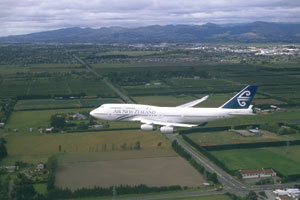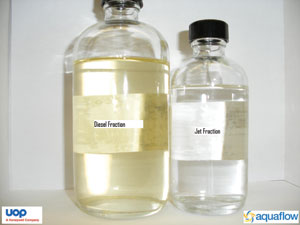Boeing planes successfully fly with biofuels



January 15, 2009
BY Anna Austin
Aircraft manufacturer Boeing Co. has been at the center of several jetliner biofuel test flights recently after partnering with various airlines, alternative fuel producers and technology providers across the globe.
Most recently, Boeing, Continental Airlines, UOP LLC, engine company CFM International, algae-based fuel eveloper Sapphire Energy and jatropha oil provider Terrasol conducted a demonstration flight of a U.S. commercial airliner powered by 50 percent jatropha- and algae-based biofuel, and 50 percent traditional jet fuel. On Jan. 7, a Boeing 747-800 equipped with two CFM56-7B engines performed multiple tests during a two-hour flight around Houston, which included power accelerations and decelerations, an in-flight engine shutdown and restart, and other standard and nonstandard flight maneuvers. The crew consisted of two pilots, an engineer and no passengers. Continental expected the post-flight analysis to indicate that the lower-emission biofuel blend could replace regular fuel without the loss of performance or safety.
Boeing also teamed with Air New Zealand for a biofuel test flight that proved successful after a month-long delay. Air New Zealand pushed the test flight back from Dec. 3 after one of its Airbus A320s crashed in an unrelated test flight Nov. 27. All seven people on board were killed. On Dec. 30, a 747-400 jetliner left the Auckland, New Zealand, airport with one of its four Rolls-Royce RV211 engines powered with a blend of 50 percent standard jet fuel and 50 percent synthetic paraffinic kerosene derived from jatropha oil. Air New Zealand
Chief Executive Officer Rob Fyfe said the flight is a milestone for the airline, and commercial aviation in general.
Across the Pacific Ocean on Jan. 30, Japan Airlines will fuel a Boeing 747-300 aircraft with 50 percent algae, camelina and jatropha oil, and 50 percent jet fuel for a one-hour demonstration flight around Tokyo. Montana-based Sustainable Oils Inc. provided the camelina oil, India-based Terasol Energy supplied the jatropha oil, and California-based Sapphire Energy supplied the algae oil. The fuel mix, which will power one of the aircraft's four Pratt & Whitney engines, was produced via UOP's proprietary hydro-processing technology.
In other aircraft biofuel news, New Zealand-based Aquaflow Bionomic Corp. announced it had successfully refined wild algae into a sample of synthetic paraffinic kerosene, which the company believes can be used to power commercial and military aircraft. It obtained its wild algae from oxidation ponds in Marlborough, New Zealand. Company Director Nick Gerritsen said the sample, which was extracted from algae using UOP's process technology, meets Jet A-1 specifications, including density, flash point and freeze point.
Most recently, Boeing, Continental Airlines, UOP LLC, engine company CFM International, algae-based fuel eveloper Sapphire Energy and jatropha oil provider Terrasol conducted a demonstration flight of a U.S. commercial airliner powered by 50 percent jatropha- and algae-based biofuel, and 50 percent traditional jet fuel. On Jan. 7, a Boeing 747-800 equipped with two CFM56-7B engines performed multiple tests during a two-hour flight around Houston, which included power accelerations and decelerations, an in-flight engine shutdown and restart, and other standard and nonstandard flight maneuvers. The crew consisted of two pilots, an engineer and no passengers. Continental expected the post-flight analysis to indicate that the lower-emission biofuel blend could replace regular fuel without the loss of performance or safety.
Boeing also teamed with Air New Zealand for a biofuel test flight that proved successful after a month-long delay. Air New Zealand pushed the test flight back from Dec. 3 after one of its Airbus A320s crashed in an unrelated test flight Nov. 27. All seven people on board were killed. On Dec. 30, a 747-400 jetliner left the Auckland, New Zealand, airport with one of its four Rolls-Royce RV211 engines powered with a blend of 50 percent standard jet fuel and 50 percent synthetic paraffinic kerosene derived from jatropha oil. Air New Zealand
Chief Executive Officer Rob Fyfe said the flight is a milestone for the airline, and commercial aviation in general.
Across the Pacific Ocean on Jan. 30, Japan Airlines will fuel a Boeing 747-300 aircraft with 50 percent algae, camelina and jatropha oil, and 50 percent jet fuel for a one-hour demonstration flight around Tokyo. Montana-based Sustainable Oils Inc. provided the camelina oil, India-based Terasol Energy supplied the jatropha oil, and California-based Sapphire Energy supplied the algae oil. The fuel mix, which will power one of the aircraft's four Pratt & Whitney engines, was produced via UOP's proprietary hydro-processing technology.
In other aircraft biofuel news, New Zealand-based Aquaflow Bionomic Corp. announced it had successfully refined wild algae into a sample of synthetic paraffinic kerosene, which the company believes can be used to power commercial and military aircraft. It obtained its wild algae from oxidation ponds in Marlborough, New Zealand. Company Director Nick Gerritsen said the sample, which was extracted from algae using UOP's process technology, meets Jet A-1 specifications, including density, flash point and freeze point.
Advertisement
Advertisement
Upcoming Events





